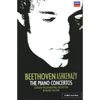Beethoven (The) Piano Concertos
Two grand old men in younger days bring joy and energy to Beethoven
View record and artist detailsRecord and Artist Details
Composer or Director: Ludwig van Beethoven
Genre:
Orchestral
Label: Decca
Magazine Review Date: 13/2007
Media Format: Digital Versatile Disc
Media Runtime: 277
Mastering:
Stereo
Catalogue Number: 074 3214

Tracks:
| Composition | Artist Credit |
|---|---|
| Leonore |
Ludwig van Beethoven, Composer
Bernard Haitink, Conductor London Philharmonic Orchestra Ludwig van Beethoven, Composer |
| Concerto for Piano and Orchestra No. 1 |
Ludwig van Beethoven, Composer
Bernard Haitink, Conductor London Philharmonic Orchestra Ludwig van Beethoven, Composer |
| Symphony No. 8 |
Ludwig van Beethoven, Composer
Bernard Haitink, Conductor London Philharmonic Orchestra Ludwig van Beethoven, Composer |
| Concerto for Piano and Orchestra No. 2 |
Ludwig van Beethoven, Composer
Bernard Haitink, Conductor London Philharmonic Orchestra Ludwig van Beethoven, Composer |
| Concerto for Piano and Orchestra No. 3 |
Ludwig van Beethoven, Composer
Bernard Haitink, Conductor London Philharmonic Orchestra Ludwig van Beethoven, Composer |
| Egmont, Movement: Overture |
Ludwig van Beethoven, Composer
Bernard Haitink, Conductor London Philharmonic Orchestra Ludwig van Beethoven, Composer |
| Concerto for Piano and Orchestra No. 4 |
Ludwig van Beethoven, Composer
Bernard Haitink, Conductor London Philharmonic Orchestra Ludwig van Beethoven, Composer |
| Concerto for Piano and Orchestra No. 5, 'Emperor' |
Ludwig van Beethoven, Composer
Bernard Haitink, Conductor London Philharmonic Orchestra Ludwig van Beethoven, Composer |
Author: Jed Distler
An endearing “real-time” quality characterises the production values of these 1974 BBC television transmissions, notably in how host Basil Moss announces the performers as they enter and exit the stage – as if we couldn’t see them! It’s also heartening to see Bernard Haitink and Vladimir Ashkenazy young and trim, sporting sideburns, and infusing Beethoven’s piano concertos with joy and energy.
Their musical rapport is evident in their body language. You especially perceive this in the slow movements, where the piano solos and orchestral tuttis dovetail in the manner of a long-married couple who finish each other’s sentences. In the Rondos, Ashkenazy favours slightly brisker tempi and more spontaneously inflected phrasing than in his similar yet somewhat heavier-gaited studio recordings with Solti in Chicago from two years earlier. Often the pianist concludes a particularly virtuoso passage with an upward gesture in the air but there’s no calculated flamboyance in the way he mouths along as he sits close to the keyboard and watches his impeccable fingers execute difficult scales, double notes, leaps and trills with no effort.
Nowhere is it mentioned that Ashkenazy provides his own vigorous, idiomatic cadenzas for the First and Second Concertos. Although the restored mono sound loses definition in loud moments, the LPO’s vivid, responsive playing certainly comes through in fine performances of the Egmont and Third Leonore Overture (where the camera captures Haitink’s rapt response to the offstage trumpet solo). By contrast, the Eighth Symphony’s brash and sardonic edges are slightly smoothed over. In sum, Ashkenazy fans will find considerable documentary and musical value in this welcome release.
Their musical rapport is evident in their body language. You especially perceive this in the slow movements, where the piano solos and orchestral tuttis dovetail in the manner of a long-married couple who finish each other’s sentences. In the Rondos, Ashkenazy favours slightly brisker tempi and more spontaneously inflected phrasing than in his similar yet somewhat heavier-gaited studio recordings with Solti in Chicago from two years earlier. Often the pianist concludes a particularly virtuoso passage with an upward gesture in the air but there’s no calculated flamboyance in the way he mouths along as he sits close to the keyboard and watches his impeccable fingers execute difficult scales, double notes, leaps and trills with no effort.
Nowhere is it mentioned that Ashkenazy provides his own vigorous, idiomatic cadenzas for the First and Second Concertos. Although the restored mono sound loses definition in loud moments, the LPO’s vivid, responsive playing certainly comes through in fine performances of the Egmont and Third Leonore Overture (where the camera captures Haitink’s rapt response to the offstage trumpet solo). By contrast, the Eighth Symphony’s brash and sardonic edges are slightly smoothed over. In sum, Ashkenazy fans will find considerable documentary and musical value in this welcome release.
Discover the world's largest classical music catalogue with Presto Music.

Gramophone Digital Club
- Digital Edition
- Digital Archive
- Reviews Database
- Full website access
From £8.75 / month
Subscribe
Gramophone Full Club
- Print Edition
- Digital Edition
- Digital Archive
- Reviews Database
- Full website access
From £11.00 / month
Subscribe
If you are a library, university or other organisation that would be interested in an institutional subscription to Gramophone please click here for further information.




